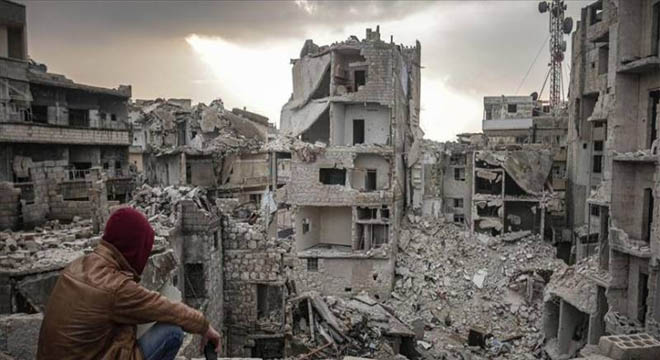Ten years since its outbreak in 2011, Syria’s ongoing civil war remains on the list of top world crises, with tens of thousands of civilians killed and millions displaced.
A decade after taking refuge in Jordan, hopes of Syrian refugees for a free and democratic Syria remain hanging in the air.
As the Syrian conflict enters its 11th year, despair has been looming among the refugees as the crisis persists.
Muhammad al-Hariri, 33, blamed world powers for the ongoing bloodshed in Syria. “These powers only want to usurp our country’s resources, but don’t care about whatever happens to us,” al-Hariri told Anadolu Agency.
“We keep waiting every year for the day to see an end to the crisis, but surprisingly days quickly pass without any achievement on the ground,” he said.
“It has been years since tyranny and injustice thwarted our revolution,” al-Hariri lamented.
For Khaled Al-Awda, 46, the Syrian revolution was stolen, blaming politicians for the bloodshed.
“Politicians stay in the most prestigious hotels and eat delicious food and negotiate in our name without authority,” Al-Awda bitterly said, adding that they only think of their personal interests.
Resistance
Khaled Al-Rifi, the pseudonym of a young Syrian in his twenties, believes that resistance is the only solution to the Syrian conflict.
“We lost our country and our homes and became refugees and nothing is worse than that,” Al-Rifi told Anadolu Agency.
“They took away our freedom and dignity — our most precious possessions,” Al-Rifi painfully recalled. “We will achieve our goal no matter how long it takes.”
The Syrian young man praised the opposition groups fighting the Bashar al-Assad regime, describing them as “heroes” and “defenders of freedom”.
Sarab Ayyash, a mother of three sons, says her support for the revolution is stronger than ever and called for its continuation.
Having lost her husband in attacks by pro-regime militias, Ayyash called on the world to show a “real humane stance” towards Syria and remove the “unjust regime” to pave the way for the safe return of Syrians to their country.
No silence to injustice
Seeing no end to the crisis, Abu Khaled reminisces the good-gone days of life in Syria before the civil war and narrates the stories to his sons, daughters, and grandchildren.
In a tone of despair, Abu Khaled told Anadolu Agency that bloodshed in Syria will not stop “because many countries do not want that to happen”.
“This [civil war] makes many things easier for them,” he said.
“Everyone knows that many countries are trying to deepen the crisis,” Abu Khaled said, going on to add that “the revolution was forced to take a different course despite initial enthusiasm about its success”.
Abu Khaled expressed hope that revolutionaries will continue their struggle against the Assad regime. “History proves that Syrians have never been and will never be silent to injustice,” he said.
Muhammad al-Hawari, a spokesman for the UN refugee agency (UNHCR), told Anadolu Agency that the agency will continue to provide necessary services to Syrian refugees in Jordan and other parts of the world.
“No matter how long the conflict in Syria continues, we will make sure to serve them [Syrian refugees] and assist them with all the means available to us despite the difficulties,” he said.
The middle of March marks the start of the Syrian revolution when peaceful demonstrations organized by a group of young people in the southwestern province of Deraa demanded reforms by the Assad regime.
The revolution soon turned into a civil war when the regime branded the people demanding change “terrorists” and used force to brutally disperse peaceful protesters.
Armed conflicts between the Assad regime and opposition groups gathered under the Free Syrian Army (FSA) banner started in 2012.
According to the UNHCR, 6.6 million Syrians had to leave the country, which before 2011 had a population of around 22-23 million.
Jordan, which shares a 375 km border with Syria, hosts approximately 1.4 million Syrians, nearly half of them registered as refugees by the UNHCR.
Follow the PNI Facebook page for the latest news and updates.









